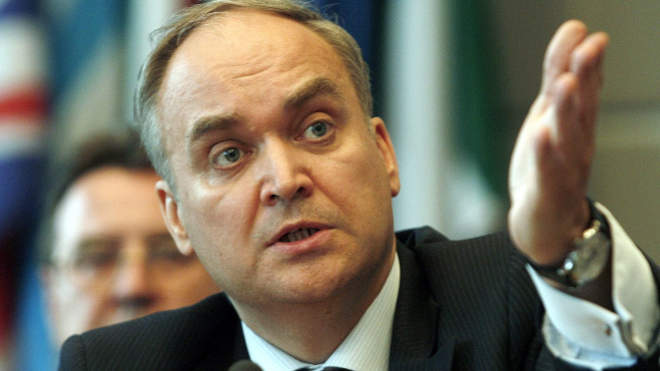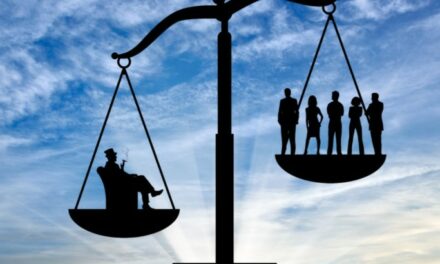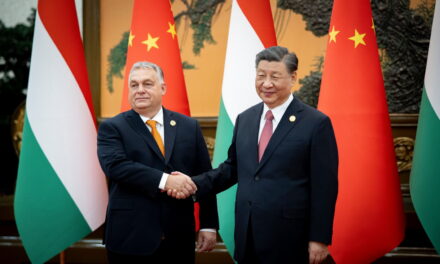According to Anatoly Antonov, the Russian ambassador in Washington, the current model of capitalism is experiencing a doctrinal crisis, and has brought the West to the point where it can no longer offer anything other than its own, forced dominance to the rest of the world. The article was published in The National Interest , its translation is published in its entirety.
In recent days, the attention of officials and experts from the United States and other Western countries has once again turned to the implementation of the so-called Istanbul Agreements. And Russia, which suspended its participation in the mechanism for a few days, is again accused of causing a humanitarian crisis and famine in developing countries.
However, no one seems to be aware that the reason for our decision, which has since been withdrawn, was the Ukrainian drone attacks on ships and port infrastructure in Sevastopol. They simply took advantage of the grain export corridor. Under such circumstances, how could our experts guarantee the safety of civilian ships?
However, our arguments fell on deaf ears. The State Department and the United States Permanent Mission to the United Nations have stated that they see no justification for suspending our participation in the grain agreements, repeating as a mantra that our decision will lead to widespread famine.
Many people dispute the fact that only a fraction of the shipments reached the truly endangered countries. They also keep silent about the fact that if there were no sanctions, Russia would be able to cover a significant part of the food shortage. Meanwhile, to immediately send up to 500,000 tons of grain and 300,000 tons of fertilizer to the poorest countries is being criticized as "too little, too late."
Meanwhile, the West continues to call the special operation in Ukraine - which they themselves are not guilty of causing - the main source of the global economic crisis; the price increase and the deterioration of energy and food security are directly related to our country's actions.
However, if we look closely at the matter, we can see that the root of our current problems is the macroeconomic direction of the Western nations, above all the United States.
Washington categorically rejects the transition to a polycentric system of international relations, and instead tries to shape the world according to its own, "uniquely true" standards. He continues to insist on his "God-given" prerogative to replace international law with "rules" invented by an unknown party. At the same time, he ignores diplomacy and the UN Charter with dignified persistence:
he wants to punish those who disagree with his approach and intimidate everyone else.
Trampling the fundamental and seemingly sacred postulates of free trade, competition and the inviolability of private property, it introduces various restrictions and initiates trade wars, but it does not hesitate to interfere in the internal affairs of other countries.
The number of sanctions and illegal, unilateral restrictions has already taken on astonishing proportions. There are more than 2,500 individuals on the Russia-related "blacklist" alone, and outright bans are complemented by vague sectoral and trade restrictions.
American authorities deny the obvious: sanctions are increasingly hitting the countries that imposed them.
Embargoes on Russian commodity exports are accelerating record inflation, driving up prices at local gas stations and exacerbating supply chain difficulties. American businesses say recession is looming.
The continuous prohibition of cooperation with Russian companies, including secondary sanctions, also causes disruptions in the supply of products to world markets. On the losing side are the poor, those countries whose economy, food, and sometimes national security depend on cheap, high-quality Russian products.
Let's note that very few people mention that with its destructive actions, the USA causes damage not only to developing countries, but also to its own allies, including the Europeans.
After the EU countries were persuaded to introduce sanctions against Russia, Washington's old dream came true: the system of economic relations built with Moscow over many years, based on mutual benefits, was shattered. With this, it was possible to deprive Europe of the possibility to compete effectively with the United States. The aim is to get them used to their own liquefied natural gas (LNG): as even French President Emmanuel Macron recently noted,
the Americans sell it to their transatlantic friends at a price three to four times higher than domestic prices. This seems to be the premium of "democracy".
The "anti-successes" of the American administration are particularly noticeable in the energy sector. First, the White House has declared a quasi-war against the nation's energy industry. He declared that it was time for oil and gas companies to gradually withdraw from domestic production and urged them to switch to wind and solar energy and other "green" - often undertested - innovations. Then, against the background of the events in Ukraine, Washington banned the import of Russian energy resources to the USA. After that, he forced other countries to take similar measures, primarily in Europe. It only dawned on him when these moves led to colossal fluctuations in fuel prices worldwide, but above all in the United States.
Unfortunately, however, the lack of political will does not allow Western countries to stop and admit their mistakes.
They even used the slogan "Putin's price hike", even though such clumsy decisions are harmful to absolutely everyone. The face-saving recipe developed in the Ministry of Finance - the so-called price ceiling for Russian oil - will only lead the global economy into even greater chaos, while the promise that Russia will sell its oil at a loss was nothing but a myth from the beginning.
We will not ensure the well-being of others at our own expense. We will not sell resources to those who artificially limit prices.
Our message is clear: if the mechanism is introduced, no one can guarantee that in the future someone will not try to extend this scenario first to gas, then to metals, and consequently to every type of commodity that Western capitalists have ever laid eyes on.
By the way, many other countries, including members of OPEC+, are watching this particular approach with interest, to put it mildly, despite the fact that many of them are allies of the USA. The decision to slow production, which the forum made in October, was merely a reaction to real market trends, not some kind of political ploy. Washington's accusations of an "anti-American conspiracy" targeting its own partners are just another confirmation of the destructive nature of its economic strategy.
But it also highlights the doctrinal crisis of the current model of capitalism, when the West cannot offer anything other than its own forced dominance to the rest of the world.
The situation is aggravated by what happened to the Nord Stream gas pipelines. An attack on an infrastructure that is unique in terms of security is an extremely dangerous precedent. All critical objects, regardless of where they are located, are now under threat.
Moreover, this act of terrorism could not have been carried out without the government's involvement.
The obvious purpose of the sabotage was to permanently sever the mutually beneficial energy relations between Europe and Russia. Its goal is to radically switch regional consumers to expensive resources, be it foreign liquefied natural gas or new, clean technologies.
In any case, entire industries stand to lose, as do ordinary citizens.
And the process of deindustrialization of the European continent is only accelerating. The risks of such a development are obvious, as are the benefits for the US, especially in light of Washington's stated intention to loop supply chains back onto itself and build them only with suppliers from the "right" jurisdictions.
Incredibly, local strategists seem naïve enough to believe that such decisions cannot undermine the US dollar's global position - despite the fact that US national debt levels have exceeded an astronomical $31 trillion. They take advantage of the opportunity to keep the printing press running.
At the same time, they offer absolutely amazing new, "creative" restrictive measures, such as the seizure of funds belonging to a foreign state, without any kind of negotiation or investigation. Meanwhile, the US ignores the fears of other, primarily developing, countries about sharply rising interest rates, pushing them deeper into debt.
Nobody here seems to care about the consequences of these moves on the world economy, nor the fact that companies and governments around the world are increasingly abandoning the use of American currency. Although the comfort and safety of the dollar was generally recognized, it was gradually becoming a thing of the past; its own creators transform it into a mechanism of espionage, blackmail and sanctions, thus serving the political interests of the USA.
Under these conditions, the world's economic relations become dollar-free, because the development of new international payment systems is an inevitable process.
These agreements will not depend on a single decision-making center, which means that they will become more secure and democratic. On the part of Washington, the artificial restrictive measures represent an intervention, but in the long run they only encourage the movement in the direction of true multipolarity.
Russia categorically opposes the United States' efforts to divide the world economy in a neo-colonial way, for example, to unify everything in order to preserve Western dominance, and to introduce financial and technological monopolies.
It seeks to build a system in which capitalists must choose between unprofitable deals and the threat of sanctions, while in reality they become slaves economically, politically and sometimes socio-culturally; this is the way to nowhere.
Much of the world, including countries in Africa, Asia, Latin America, and the Middle East, agrees with the latter proposition. It is becoming more and more obvious that they are tired of Washington's unilateralism and the lack of normal, mutually beneficial cooperation.
The Russian Federation focuses on equal dialogue with partners. It is vital to find solutions, even if not ideal ones, that can make the world more stable and safer. At the same time, we do not recommend replacing unipolarity with the creation of two, three or four other centers of power. On the contrary, we stand for the right of every country to exist and develop freely. The current complicated geopolitical situation should not hinder our efforts to build this kind of reciprocity with other nations.
It is based on the Eurasian Economic Union (EEU), the Commonwealth of Independent States (CIS), the BRICS, the Shanghai Cooperation Organization (SCO), the Asia-Pacific Economic Cooperation (APEC), and the Asia-Pacific Economic Cooperation and Social Committee (ESCAP) for our work with our friends. These formats are not directed against anyone. They were created and operate in order to strengthen trust between the capitals. It is not ruled out that all interested states will be involved in this joint effort, without a division between "right" and "wrong". We appreciate that multilateral trade, economic and investment cooperation is at the forefront of the activities of these formats. The idea is to realize globalized integration without depersonalization and promote good neighborly cooperation, without dividing lines and artificial rules.
Of course, this does not exclude cooperation with Western colleagues and economic organizations focused on Washington and its allies, such as the Bretton Woods institutions. However, such a conversation must be based on mutual respect and the ability to compromise and find a real balance of interests. Only in this way will the international financial system be able to rebuild itself, remove the stamp of the "servant of the golden billions" and pave the way for the sovereign development of all countries.
Russia will contribute to these efforts in every possible way.
Featured image: Hans Punz/AP Photo












